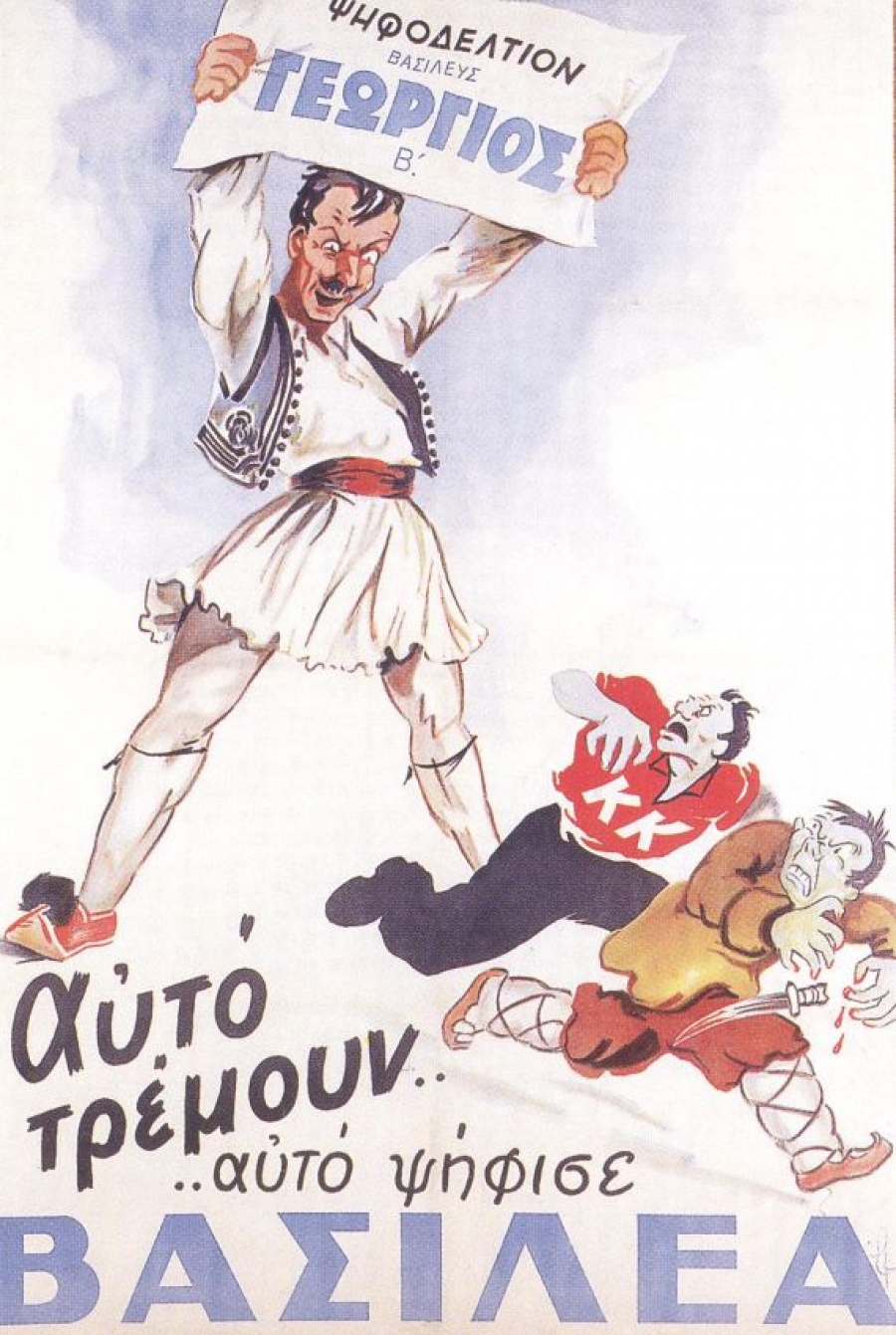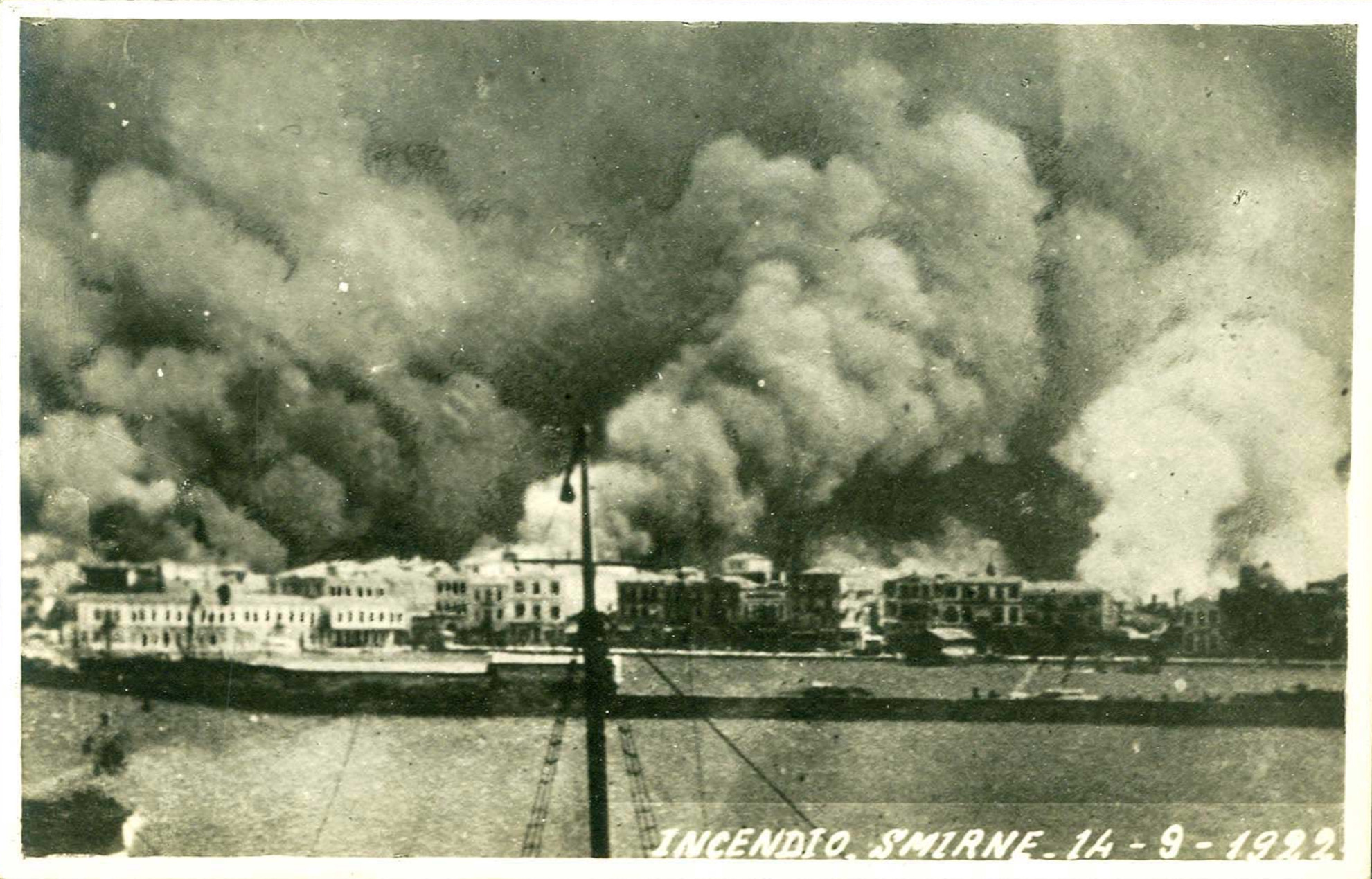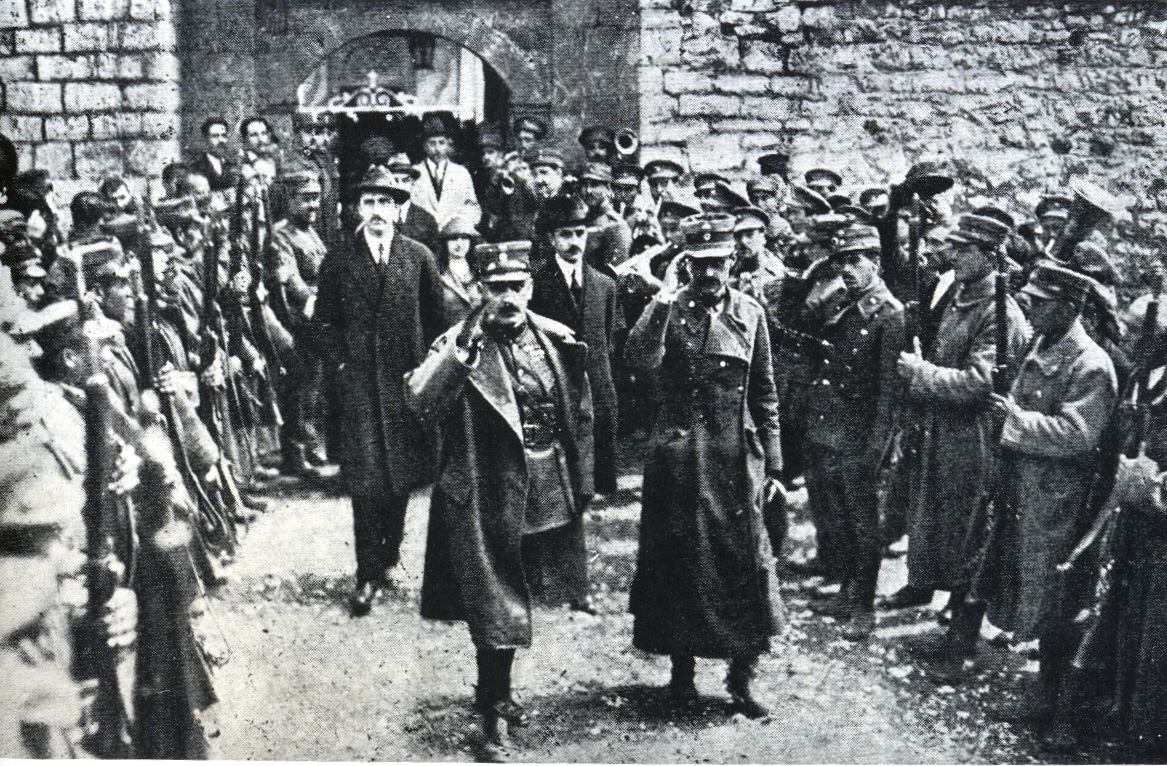|
People's Party (Greece)
The People's Party or Populist Party () was a conservative and pro-monarchist Greek political party founded by Dimitrios Gounaris, the main political rival of Eleftherios Venizelos and his Liberal Party. The party existed from 1920 until 1958. History Gounaris founded the party out of the Nationalist Party in October 1920, after his return from exile in Corsica. Gounaris and his parliamentary candidates campaigned for the withdrawal of the Hellenic Army from Asia Minor, which it occupied under the terms of the Treaty of Sèvres in the aftermath of World War I. The party was triumphant in the 1920 Greek general election and formed successive governments under Gounaris, Nikolaos Stratos and Petros Protopapadakis. However, it failed to live up to its promise to bring the troops back home and became more entangled in Asia Minor than their Liberal Party predecessors. To complicate matters further, after the death of King Alexander on October 25, 1920, it brought back exiled Constan ... [...More Info...] [...Related Items...] OR: [Wikipedia] [Google] [Baidu] |
Dimitrios Gounaris
Dimitrios Gounaris (; 5 January 1867 – 28 November 1922) was a Greek politician who served as the Prime Minister of Greece from 25 February to 10 August 1915 and 26 March 1921 to 3 May 1922. Leader of the People's Party (Greece), People's Party, he was the main right-wing politics, right-wing opponent of his contemporary Eleftherios Venizelos. Early life He studied law at Athens University and continued his studies in Germany, France and England, before returning to his native Patras. He was elected deputy for Achaea in 1902 and distinguished himself as an orator and a member of the so-called "Japanese Group" that opposed the Georgios Theotokis government in 1906–1908. Gounaris himself, however, joined the government in 1908 as Finance Minister, hoping to implement a reformist program, thereby causing the dissolution of the group, although he was soon forced to resign. Despite his progressive views (he was an admirer of the Otto von Bismarck, Bismarckian German social laws ... [...More Info...] [...Related Items...] OR: [Wikipedia] [Google] [Baidu] |
Nikolaos Stratos
Nikolaos Stratos ( el, Νικόλαος Στράτος; 16 May 1872 – 28 November 1922 (15 November Old Style dating)) was a Prime Minister of Greece for a few days in May 1922. He was later tried and executed for his role in the Catastrophe of 1922. Early political career Born in 1872 in Loutro, Aetolia-Acarnania, Stratos was first elected to Parliament in 1902. He was chosen as Interior Minister in 1909 under Kiriakoulis Mavromichalis after the Military League took power. In 1910 he joined the Liberal party of Venizelos and in 1911 he was elected President of the Parliament. However, during the National Schism, he disagreed with the liberals and sided with King Constantine. In 1916 he founded the "National Conservative Party" and advocated neutrality during the World War. Prime minister In 1922, Greece was in turmoil as the war in Asia Minor was in a stalemate after the failure of the Greek attempt to capture Ankara the previous year. When Prime Minister Dimitrios Gouna ... [...More Info...] [...Related Items...] OR: [Wikipedia] [Google] [Baidu] |
Greek Civil War
The Greek Civil War ( el, ο Eμφύλιος [Πόλεμος], ''o Emfýlios'' [''Pólemos''], "the Civil War") took place from 1946 to 1949. It was mainly fought against the established Kingdom of Greece, which was supported by the United Kingdom and the United States and won in the end. The losing opposition held a self-proclaimed people's republic, the Provisional Democratic Government, Provisional Democratic Government of Greece, which was governed by the Communist Party of Greece (KKE) and its military branch, the Democratic Army of Greece (DSE). The rebels were supported by Socialist Federal Republic of Yugoslavia, Yugoslavia and the Soviet Union. The war has its roots at the WW2 conflict, between the Communist Party of Greece, communist-dominated left-wing Greek Resistance, resistance organisation, the National Liberation Front (Greece), EAM-ELAS, and loosely-allied anticommunist resistance forces. It later escalated into a major civil war between the state and the communist ... [...More Info...] [...Related Items...] OR: [Wikipedia] [Google] [Baidu] |
Themistoklis Sophoulis
Themistoklis Sofoulis or Sophoulis (; 24 November 1860 – 24 June 1949) was a prominent centrist and liberal Greek politician from Samos Island, who served three times as Prime Minister of Greece, with the Liberal Party, which he led for many years. Early life Sofoulis was born in 1860 in Vathy of Samos, then an autonomous principality under Ottoman suzerainty. His father was Panagiotis Sofoulis, who had fought for the autonomy of the island. Sofoulis studied in the faculty of philosophy of the National and Kapodistrian University of Athens and then in Germany, where he specialised in archaeology. As an archaeologist he published certain insightful surveys and he participated actively in various excavations around Greece. Entering Samian politics In 1900 he abandoned archaeological excavations and he was elected a deputy for Samos, being the leader of his own radical faction, which was fighting for the political freedoms of Samos, as stipulated by the Treaty of Autonomy of 1 ... [...More Info...] [...Related Items...] OR: [Wikipedia] [Google] [Baidu] |
1946 Greek Plebiscite
A referendum on maintaining the monarchy was held in Greece on 1 September 1946.Dieter Nohlen & Philip Stöver (2010) ''Elections in Europe: A data handbook'', p830 The proposal was approved by 68.4% of voters with a turnout of 88.6%. Background The referendum was the fourth since 1920 on the country's monarchy. The 1946 parliamentary elections, in which the right-wing parties achieved a landslide, had just taken place. The new conservative government of Konstantinos Tsaldaris was favorable to George II, but what influenced the result more was the atmosphere of imminent civil war. The civil war convulsed Greece during two main periods: first between 1943 and 1944 between the KKE-dominated EAM/ELAS partisans and the right-wing resistance groups and the internationally recognized Greek government-in-exile which had returned to the country in November 1944 and later in 1946–1949. The collaborationist government had collapsed after the Germans left and all its leaders were in ... [...More Info...] [...Related Items...] OR: [Wikipedia] [Google] [Baidu] |
1946 Greek Legislative Election
Parliamentary elections were held in Greece on 31 March 1946. Dieter Nohlen & Philip Stöver (2010) ''Elections in Europe: A data handbook'', p830 The result was a victory for the United Alignment of Nationalists, an alliance that included the People's Party, the National Liberal Party, and the Reform Party, which won 206 of the 354 seats in Parliament.Nohlen & Stöver, p859 As a result Konstantinos Tsaldaris became Prime Minister leading a right-wing coalition. Nonetheless, he soon decided to resign in favor of Themistoklis Sophoulis, who led a government of national unity (conservative and centre-liberal forces) during the entire second phase of the civil war (1946–1949). One of the priorities of the new government was the proclamation of a plebiscite for the restoration of the Greek monarchy. The elections were marked by the boycott of the Communist Party of Greece claiming in protest against the unfolding, state-tolerated White Terror against the former members of EAM-E ... [...More Info...] [...Related Items...] OR: [Wikipedia] [Google] [Baidu] |
Konstantinos Tsaldaris
Konstantinos Tsaldaris (, 14 April 1884 – 15 November 1970) was a Greek politician and twice Prime Minister of Greece. Tsaldaris was born in Alexandria, Egypt. He studied law at the University of Athens as well as Berlin, London and Florence. He became a prefectural politician from 1915 to 1917. In 1926, he was elected as a deputy for the first time in the Argolidocorinthia prefecture (now split into Argolis and Corinthia) with the Freethinkers' Party of Ioannis Metaxas. In 1928, he became a member of the People's Party, the leader of which was his uncle Panagis Tsaldaris. He entered Panagis Tsaldaris' second government as Vice Minister of Transportation from 1933 to 1935, and continued as Under-Secretary to the Prime Minister. After the death of Panagis Tsaldaris in 1936, he became a member of the administrative commission of the People's Party, which was however soon dissolved under the dictatorship of Metaxas. After Liberation in 1944, he was recognized as the leader o ... [...More Info...] [...Related Items...] OR: [Wikipedia] [Google] [Baidu] |
George II Of Greece
George II ( el, Γεώργιος Βʹ, ''Geórgios II''; 19 July Old_Style_and_New_Style_dates">O.S.:_7_July.html" ;"title="Old_Style_and_New_Style_dates.html" ;"title="nowiki/>O.S.:_7_July">Old_Style_and_New_Style_dates.html"_;"title="nowiki/>Old_Style_and_New_Style_dates">O.S.:_7_July1890_–_1_April_1947)_was_O.S.:_7_July">Old_Style_and_New_Style_dates.html"_;"title="nowiki/>Old_Style_and_New_Style_dates">O.S.:_7_July1890_–_1_April_1947)_was_List_of_kings_of_Greece">King_of_Greece_from_September_1922_to_March_1924_and_from_November_1935_to_his_death_in_April_1947. The_eldest_son_of_King_Constantine_I_of_Greece.html" "title="List_of_kings_of_Greece.html" "title="Old Style and New Style dates">O.S.: 7 July">Old_Style_and_New_Style_dates.html" ;"title="nowiki/>Old Style and New Style dates">O.S.: 7 July1890 – 1 April 1947) was List of kings of Greece">King of Greece from September 1922 to March 1924 and from November 1935 to his death in April 1947. The eldest son of Kin ... [...More Info...] [...Related Items...] OR: [Wikipedia] [Google] [Baidu] |
Panagis Tsaldaris
Panagis Tsaldaris (also Panagiotis Tsaldaris or Panayotis Tsaldaris; el, Παναγιώτης (Παναγής) Τσαλδάρης; 5 March 1868 – 17 May 1936) was a Greek politician and the 48th Prime Minister of Greece. He was a revered conservative politician and leader for many years (1922–1936) of the conservative People's Party in the period before World War II. He was the husband of Lina Tsaldari, a Greek suffragist, member of Parliament, and the Minister for Social Welfare. Early life Tsaldaris was born in 1868 in Kamari, near Corinth in the Peloponnese. He studied in the Law School of the University of Athens and, being an excellent student, he continued his studies abroad, among other places in Berlin and Paris. After he returned to Greece, he worked as a lawyer. Because of his expertise as an advocate, he gained the respect of his colleagues. In 1919, Tsaldaris married the daughter of the university professor (and later Prime Minister of Greece) Spyridon Lambr ... [...More Info...] [...Related Items...] OR: [Wikipedia] [Google] [Baidu] |
Trial Of The Six
The Trial of the Six ( el, Δίκη των Έξι, ''Díki ton Éxi'') or the Execution of the Six was the trial for treason, in late 1922, of the Anti-Venizelist officials held responsible for the Greek military defeat in Asia Minor. The trial culminated in the death sentence and execution of six of the nine defendants. Background On September 9, 1922, Turkish military and guerilla forces entered the city of Smyrna (now İzmir), in Asia Minor, which was previously occupied by Greece by the Treaty of Sèvres. Hundreds of thousands of Greek residents from Asia Minor fled to Smyrna seeking transportation across the sea to escape the advancing Turks. The pro-royalist government in Athens lost control of the situation and could only watch as the events unfolded. The retreating Greek "Army of the East" abandoned Smyrna on September 8, the day before the Turkish Army moved in. Transportation arrived late and in too small numbers relative to the number of people trying to flee, resu ... [...More Info...] [...Related Items...] OR: [Wikipedia] [Google] [Baidu] |
11 September 1922 Revolution
The 11 September 1922 Revolution ( el, Επανάσταση της 11ης Σεπτεμβρίου 1922) was an uprising by the Greek army and navy against the government in Athens. The revolution took place on 24 September 1922, although the date was "11 September" on the Julian calendar still in use at the time in Greece. History The Greek Army had just been defeated in the Asia Minor Campaign and had been evacuated from Anatolia to the Greek islands in the eastern Aegean. Discontent among the middle-ranking officers and men for the campaign's conduct by the royal government boiled over into armed revolt led by pro-Venizelist and anti-royalist officers. The mutiny spread quickly and seized power in Athens, forcing King Constantine I to abdicate and leave the country, with a military government ruling the country until early 1924, shortly before the Greek monarchy was abolished and the Second Hellenic Republic established. The defeat of the Greek forces in Anatolia had alarmed ... [...More Info...] [...Related Items...] OR: [Wikipedia] [Google] [Baidu] |
Greco-Turkish War (1919-1922)
{{Disambiguation ...
There have been several Greco-Turkish Wars: *Greek War of Independence (1821–1830), against the Ottoman Empire *Undeclared war in 1854 during the Crimean War, with Greek irregulars invading Ottoman Epirus (Epirus Revolt of 1854) and Thessaly * First Greco-Turkish War (1897) *Greek front of the First Balkan War (1912–13) * Second Greco-Turkish War (1919–1922), also called the ''Asia Minor Campaign'' or the ''Western Front'' of the Turkish War of Independence This term may also refer to the medieval predecessor civilisations of Greece and Turkey: * Byzantine–Seljuk wars * Byzantine–Ottoman wars See also *Aegean dispute *Greece–Turkey relations *Turkish invasion of Cyprus The Turkish invasion of Cyprus began on 20 July 1974 and progressed in two phases over the following month. Taking place upon a background of Cypriot intercommunal violence, intercommunal violence between Greek Cypriots, Greek and Turkish ... [...More Info...] [...Related Items...] OR: [Wikipedia] [Google] [Baidu] |

_Stratos.jpg)





